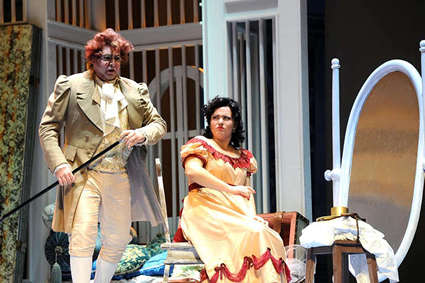| Opera Reviews | 18 April 2024 |
The Barber still cheers up and captivates the audienceby Lorenzo Fiorito |
|
| Rossini: Il barbiere di Siviglia
Teatro Municipale Giuseppe Verdi di Salerno 9 December 2018 |
|
 |
|
|
There was something innocently captivating in this production of Il barbiere di Siviglia at the Teatro Verdi in Salerno. Director Michele Sorrentino Mangini focused on the hilarious aspects of the piece, leading us effortlessly into the playful atmosphere he created, combining with an excellent cast who gave new appeal and charm to some of the most famous characters of the history of opera. The result was a brilliant performance of Rossini's comic masterpiece, an explosion of jokes, gags, misunderstandings and unmasking, offering an evening of opera buffa par excellence. The staging was a lesson on how the audience can still be entertained with the Barber, after two hundred years and thousands of productions, maintaining a rhythm perfectly fitting the score and the libretto, and inventing stage devices that work perfectly in their apparent simplicity. Flavio Arbetti’s scenery showed a house made of bars, a clear allusion to the domestic prison in which Rosina laments she is confined. The all-white set vaguely recalled Andalusia, with very few props, and an orange tree to the side. The beautiful costumes by Giusi Giustino perfectly placed the action in the original time of the libretto. The cast showed great vocal flair and acting dynamism, as they were able to capture perfectly the spirit of the score. Teresa Iervolino was a pretty and lively Rosina; her wide range makes her a semi-soprano with a contralto-like timbre, as she has a rich, dark sound, a warm low register, and full, clear high notes; her “Una voce poco fa” was lovely, as were her duets and trios with her mates. Her coloratura was always self-assured, agile and precise. Figaro was interpreted with great charm by the baritone Massimo Cavalletti, who sang some of the fastest passages with great skill, particularly "Largo al factotum", which was much appreciated by the audience. Cavalletti has everything the character needs: a warm presence, a strong funny baritone voice and the right acting brio. Pietro Adaini, as Almaviva, is a coloratura tenor, with a good timbre; his volume may not be extraordinary, but he has an agile and clear voice. George Andguladze's Don Basilio seemed a little grouchy, and not very nimble in acting as well as in singing. He sang "La calunnia" with all the correct notes, but with a quite gloomy colour. The best performance of the night was delivered by the irascible Don Bartolo of Giovanni Romeo.He was hilarious to both see and hear, his round, bright baritone delivered to perfection. And he has a great comic talent too, that aroused a lot of laughter in the hall; his total mastery of stage and action made it difficult to look away from him, even when the main scene was for other protagonists. Petya Tzoneva, in the role of the housekeeper Berta, offered a decent proof of her professionalism with “Il vecchiotto cerca moglie”, the most famous “aria di sorbetto” of all operas. In the opening scene, Luigi Cirillo sang Fiorello correctly, but was a little colourless, while Ambrogio was interpreted by a very good Umberto Salvato. The conductor Antonello Allemandi led the orchestra and chorus of the Teatro Verdi with a true Rossini wittiness, demonstrating clearly how much fun he was having, and the singers and musicians with him. He never lost his grip on the rhythmic continuity and comic timing and, always keeping a rapid pace (never pushing too much, though), he encouraged the different orchestral sections to inject large doses of energy and dynamism onto the stage. At the end, the audience broke into rapturous applause.
|
|
| Text ©
Lorenzo Fiorito Photo © Teatro Municipale Giuseppe Verdi di Salerno |
|







